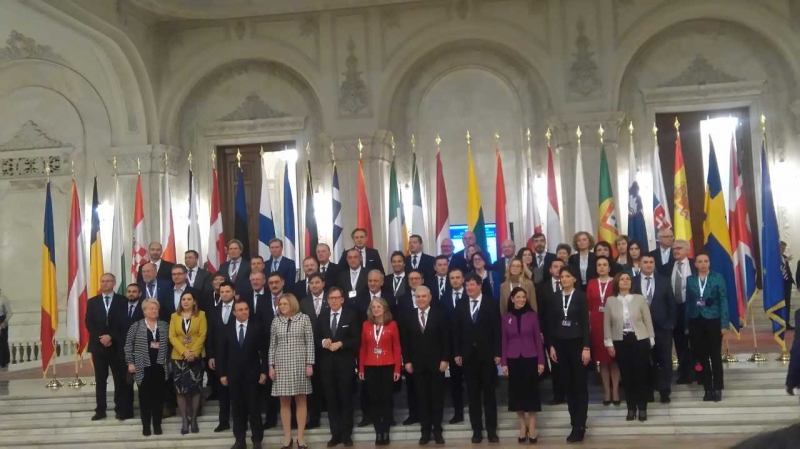Today's meeting of the Chairpersons of Committees for Union Affairs of Parliaments of the EU (COSAC) was marked by the presentation of key issues that Romania would address within the Presidency of the Council of the European Union over the next six months. Also, key aspects of the 2021-2027 Multiannual Financial Framework have been presented, as well as its impact on connecting Member States and consolidation of the Union at the internal level.
President of the Senate of Romania, Mr Călin Popescu-Tăriceanu, pointed out that COSAC represented useful platform for resolving issues of common interest of parliaments of EU member states. Dialogue between national parliaments is of particular importance for building an institutional and legislative framework, especially during the migration crisis, Brexit, elections to the European Parliament, and security and social challenges. Efforts made in the period ahead aim to show that Romania is a credible and committed partner, able to maintain traditional policies that bring concrete benefits to the daily lives of citizens and at the same time propose innovative solutions for strengthening the European Union.
The first part of the meeting was dedicated to the priorities of the six-month Romanian Presidency of the Council of the EU. Four main pillars will be the focus of the Presidency: (I) Ensuring a sustainable and equal development for all Member States through enhanced convergence, innovation, digitisation and connectivity; (II) Maintaining a safe Europe; (III) Improvement of EU as a global actor and (IV) Promotion of solidarity as a common value of Europe. Romania intends to intensify sectoral dialogue with the European Commission, in order to achieve these ambitious objectives.
In his address to the participants on the topic of procedural issues, the President of the Committee on European Affairs and Oversight of the European Funds of the National Assembly of the Republic of Bulgaria, Mr Kristian Vigenin, used the opportunity to greet the organisation of the COSAP Conference in Podgorica and suggested that the representatives of the Troika should participate in the capacity of guests in the future meetings of this regional initiative, since members of COSAP would in future be full members of the COSAC Conference.
The Chair of the Meeting, the Chairwoman of the European Affairs Committee of the Senate of Romania, Ms Gabriela Cretu, agreed with the proposal and stressed that she would send a letter of interest and that it depended upon the competence of members of COSAP whether they would be invited to participate.
Vice Prime Minister of Romania, Ms Ana Birchall, welcomed the present representatives of the candidate countries and stressed that the Romanian Presidency will also focus on the integration of the Western Balkans into the EU.
During the discussion on the priorities of the presidency, Mr Adrijan Vuksanović, Deputy Chairperson of the Committee on European Integration, used the opportunity to emphasise the progress of Montenegro in the negotiation process so far, reflected in the opening of 32 and interim closings of three chapters, and expressed his expectation that in 2019 the closing of some of the chapters would follow. Vuksanović welcomed the priorities of the Romanian Presidency and expressed hope that parliamentary cooperation would be constructive, especially in the area of enlargement policy. According to Romanian parliamentarians, enlargement policy should remain at the top of the European agenda, as a confirmation of the sustainability of European values and a stronger role of the EU as a global actor.
Impacts of connecting member states through the instrument of the 2021-2027 Multiannual Financial Framework were also presented at the meeting. The Brexit was emphasised as one of the biggest current challenges, because of the impact on the already vulnerable economy, being a serious problem for both the Member States and the Union as a whole. The guiding principles of the work of the European Commission during this year have been based on the principles of modern economy, namely: improving employment, adequate education, respect for diversity, solidarity and strengthening of the single market.
The following talked of the topics to be in focus during the Romanian Presidency of the EU Council: Mr Florian Iordache, Vice-President of the Chamber of Deputies of the Parliament of Romania, Mr Angel Tîlvăr, Chair of the European Affairs Committee of the Chamber of Deputies of the Parliament of Romania, Ms Corina Creţu, European Commissioner for Regional Policy and Mr Daniel Dăianu, member of the Romanian Academy and a CEC Bank Board member.
Deputy Chairperson, Mr Adrijan Vuksanović, and member, Mr Ranko Krivokapić, took part in the meeting on behalf of the Committee on European Integration.












